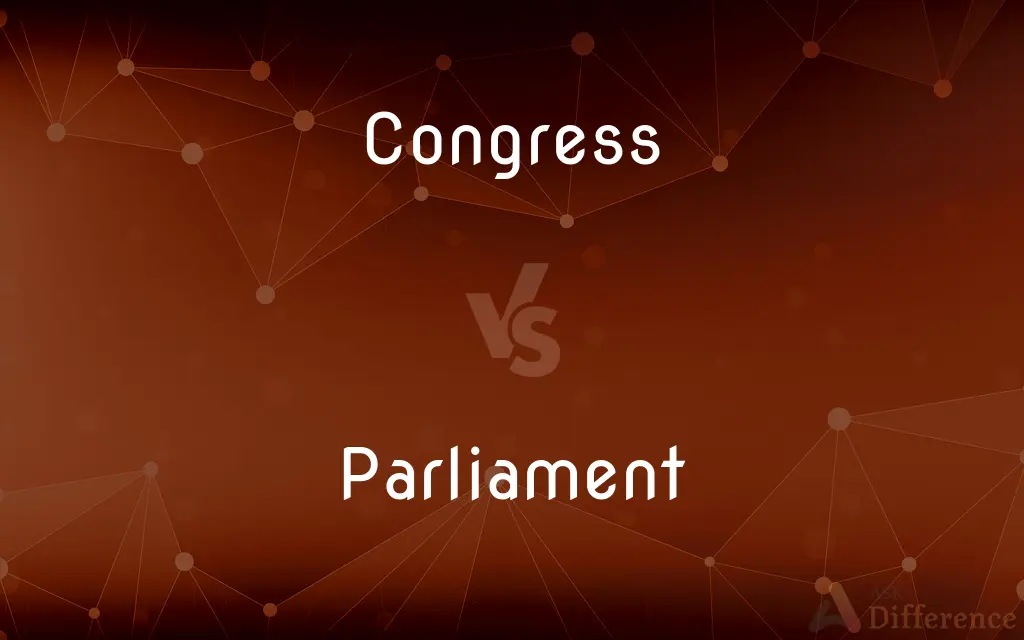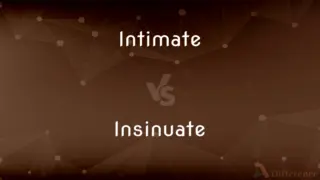Congress vs. Parliament — What's the Difference?
Edited by Tayyaba Rehman — By Fiza Rafique — Updated on October 27, 2023
"Congress" typically refers to the legislative body of the U.S., while "Parliament" is the legislative body in many other countries, with varying structures and powers.

Difference Between Congress and Parliament
Table of Contents
ADVERTISEMENT
Key Differences
"Congress" and "Parliament" are both legislative bodies, institutions where laws are made and debated. However, the specific structure and function of these bodies vary depending on the country's constitution and political system. While Congress is mainly associated with the U.S., Parliaments are found in several countries globally.
The U.S. Congress is bicameral, comprising the House of Representatives and the Senate. The two houses work together but have different powers and responsibilities. On the other hand, a Parliament can also be bicameral, like in the UK with the House of Commons and House of Lords, or unicameral, with only one house.
The powers vested in Congress and Parliament differ as well. In the U.S., Congress has significant authority, with checks and balances to limit executive power. Parliaments, depending on the country, may have stronger or weaker powers relative to their executive branches.
The method of electing members also differs. In the U.S., members of Congress are directly elected by the people. In many parliamentary systems, members of the lower house are elected directly, while members of the upper house might be appointed or have hereditary positions.
Lastly, the relationship with the executive branch is distinct. In the U.S., the President is separate from Congress. In many parliamentary systems, the head of government (e.g., Prime Minister) emerges from the majority party or coalition in Parliament, linking the executive and legislative branches more closely.
ADVERTISEMENT
Comparison Chart
Origin/Country
Primarily U.S.
Many countries globally
Structure
Bicameral (House of Representatives and Senate)
Can be bicameral or unicameral
Relationship with Executive
Separate from the President
Often includes the head of government (e.g., Prime Minister)
Election Method
Direct election
Varies (direct election, appointment, hereditary)
Power Balance
Significant power with checks on the executive
Varies depending on the country
Compare with Definitions
Congress
A formal meeting or assembly to discuss particular areas or subjects.
The annual science congress attracted researchers worldwide.
Parliament
A period during which a particular parliamentary assembly is in session.
This issue will be raised in the next parliament.
Congress
The national legislative body of the U.S.
The Congress passed a new healthcare bill last year.
Parliament
A formal conference for the discussion of public affairs.
The two nations held a parliament to discuss trade.
Congress
A representative body in certain U.S. states.
The state congress debated the education reforms.
Parliament
The collective term for the two houses in a bicameral system.
The bill was passed by both houses of Parliament.
Congress
A gathering of delegates for discussion and action.
The congress of trade unions decided on the new strategy.
Parliament
The building or buildings where a parliament meets.
They toured the historic Parliament building in London.
Congress
Congresses are formal meetings of the representatives of different countries, constituent states, organizations, trade unions, political parties or other groups. The term originated in Late Middle English to denote an encounter (meeting of adversaries) during battle, from the Latin congressus.
Parliament
In modern politics and history, a parliament is a legislative body of government. Generally, a modern parliament has three functions: representing the electorate, making laws, and overseeing the government via hearings and inquiries.
Congress
A formal assembly of representatives, as of various nations, to discuss problems.
Parliament
A representative body having supreme legislative powers within a state or multinational organization.
Congress
The national legislative body of a nation, especially a republic.
Parliament
Parliament The national legislature of the United Kingdom, made up of the House of Lords and the House of Commons.
Congress
The national legislative body of the United States, consisting of the Senate and the House of Representatives.
Parliament
A formal council summoned (especially by a monarch) to discuss important issues.
Congress
The two-year session of this legislature between elections of the House of Representatives.
Parliament
In many countries, the legislative branch of government, a deliberative assembly or set of assemblies whose elected or appointed members meet to debate the major political issues of the day, make, amend, and repeal laws, authorize the executive branch of government to spend money, and in some cases exercise judicial powers; a legislature.
Congress
The act of coming together or meeting.
Parliament
A particular assembly of the members of such a legislature, as convened for a specific purpose or period of time (commonly designated with an ordinal number – for example, first parliament or 12th parliament – or a descriptive adjective – for example, Long Parliament, Short Parliament and Rump Parliament).
Following the general election, Jane Doe took her oath of office as a member of the nation's fifth parliament.
Congress
A single meeting, as of a political party or other group.
Parliament
A gathering of birds, especially rooks or owls.
Congress
Sexual intercourse.
Parliament
(historical) Parliament cake, a type of gingerbread.
Congress
(archaic) A coming together of two or more people; a meeting.
Parliament
A parleying; a discussion; a conference.
But first they held their parliament.
Congress
A formal gathering or assembly; a conference held to discuss or decide on a specific question.
Parliament
A formal conference on public affairs; a general council;
They made request that it might be lawful for them to summon a parliament of Gauls.
Congress
A legislative body of a state, originally the bicameral legislature of the United States of America.
Parliament
The assembly of the three estates of the United Kingdom of Great Britain and Ireland, viz., the lords spiritual, lords temporal, and the representatives of the commons, sitting in the House of Lords and the House of Commons, constituting the legislature, when summoned by the royal authority to consult on the affairs of the nation, and to enact and repeal laws.
Congress
An association, especially one consisting of other associations or representatives of interest groups.
The National Congress of American Indians
Parliament
In France, before the Revolution of 1789, one of the several principal judicial courts.
Congress
(dated) Coitus; sexual intercourse.
Parliament
A legislative assembly in certain countries (e.g., Great Britain)
Congress
(intransitive) To assemble together.
Parliament
A card game in which you play your sevens and other cards in sequence in the same suit as their sevens; you win if you are the first to use all your cards
Congress
To meet in a congress.
Parliament
The supreme legislative body in various countries.
The Parliament is debating the new tax laws.
Congress
A meeting of individuals, whether friendly or hostile; an encounter.
Here Pallas urges on, and Lausus there;Their congress in the field great Jove withstands.
Congress
A sudden encounter; a collision; a shock; - said of things.
From these laws may be deduced the rules of the congresses and reflections of two bodies.
Congress
The coming together of a male and female in sexual commerce; the act of coition.
Congress
A gathering or assembly; a conference.
Congress
A formal assembly, as of princes, deputies, representatives, envoys, or commissioners; esp., a meeting of the representatives of several governments or societies to consider and determine matters of common interest.
The European powers strove to . . . accommodate their differences at the congress of Vienna.
Congress
The collective body of senators and representatives of the people of a nation, esp. of a republic, constituting the chief legislative body of the nation.
Congress
The lower house of the Spanish Cortes, the members of which are elected for three years.
Congress
The legislature of the United States government
Congress
A meeting of elected or appointed representatives
Congress
A national legislative assembly
Congress
The act of sexual procreation between a man and a woman; the man's penis is inserted into the woman's vagina and excited until orgasm and ejaculation occur
Congress
An association or union of countries or people.
The Congress of Vienna was a significant diplomatic event.
Common Curiosities
How are members of Congress chosen?
They are directly elected by the citizens.
Are Congress and Parliament the same?
No, while both are legislative bodies, their structure, powers, and roles differ depending on the country.
Is the U.S. the only country with a Congress?
No, other countries have bodies named "Congress," but the U.S. Congress is the most well-known.
Does every country with a Parliament have a similar structure?
No, parliamentary structures vary widely based on national constitutions and traditions.
How is a Prime Minister related to a Parliament?
In many parliamentary systems, the Prime Minister is the head of government and emerges from the majority in Parliament.
Can the President of the U.S. be a member of Congress?
No, the U.S. President is separate from Congress.
Who heads the Parliament in the UK?
The UK Parliament consists of two houses: the House of Commons, led by the Prime Minister, and the House of Lords.
Which countries have a Parliament?
Many countries, including the UK, Canada, India, and Australia, have Parliaments.
Is Congress always bicameral?
The U.S. Congress is bicameral, but not all bodies named "Congress" in other countries have two houses.
Can a law be passed without Congress's approval in the U.S.?
Generally, no. While the President can issue executive orders, significant
How do Congress and Parliament check executive power?
Through legislative processes, oversight functions, and sometimes votes of confidence or impeachment mechanisms.
Share Your Discovery

Previous Comparison
Comedy vs. Tragedy
Next Comparison
Intimate vs. InsinuateAuthor Spotlight
Written by
Fiza RafiqueFiza Rafique is a skilled content writer at AskDifference.com, where she meticulously refines and enhances written pieces. Drawing from her vast editorial expertise, Fiza ensures clarity, accuracy, and precision in every article. Passionate about language, she continually seeks to elevate the quality of content for readers worldwide.
Edited by
Tayyaba RehmanTayyaba Rehman is a distinguished writer, currently serving as a primary contributor to askdifference.com. As a researcher in semantics and etymology, Tayyaba's passion for the complexity of languages and their distinctions has found a perfect home on the platform. Tayyaba delves into the intricacies of language, distinguishing between commonly confused words and phrases, thereby providing clarity for readers worldwide.












































